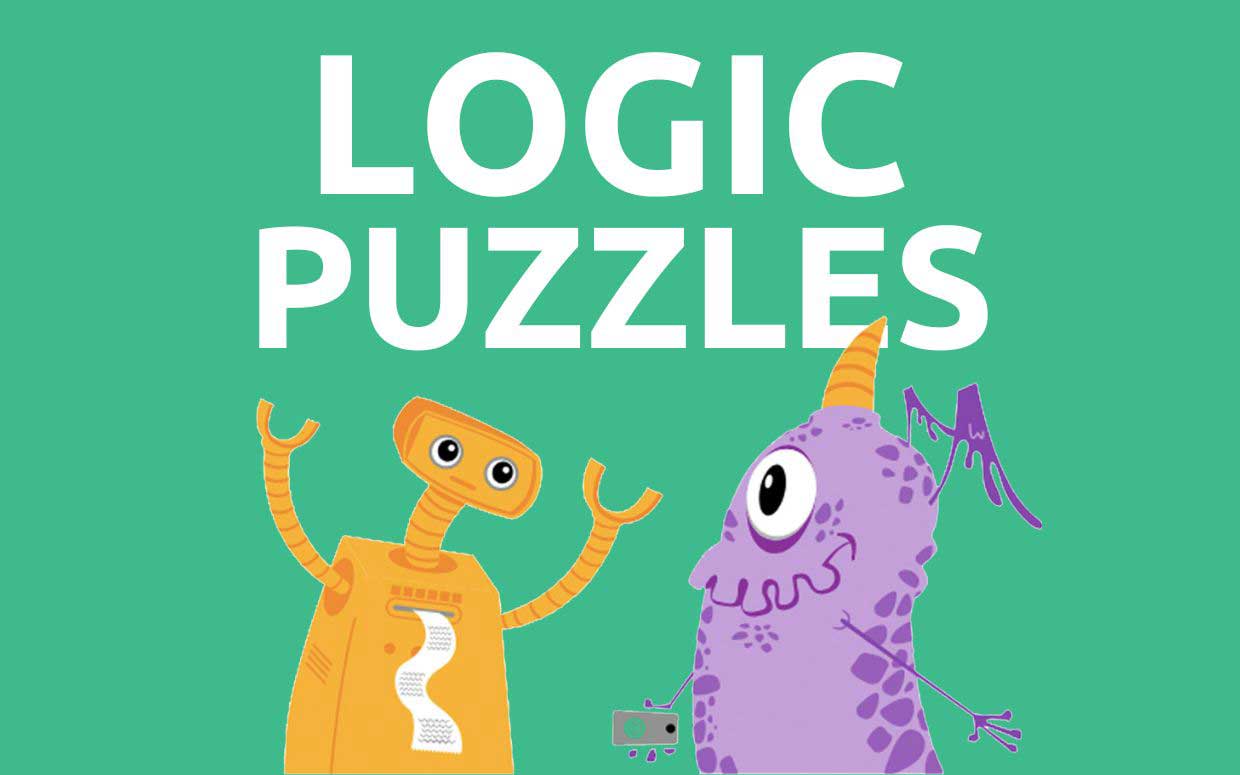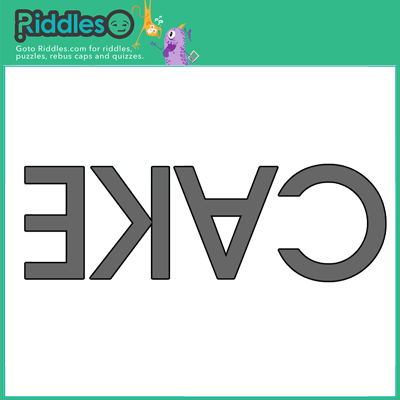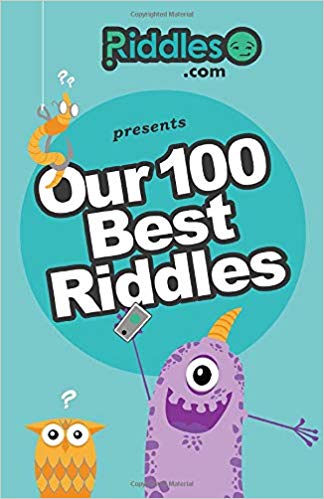
Riddle:
Wendy and Maverick are participating in a mathematical game show. Their scores are tied, so whoever gets the last riddle correct wins. The riddle goes like this: I am thinking of a number. It is a five-digit whole number. It can be read the same way forwards, backwards, and upside-down. The second digit is half of the third. The last digit is the product of the first and last digits. And the sum of all five digits is 10. What number am I thinking of? Wendy says, "12,421". Maverick says, "10,801". Who is correct?
Answer: Maverick is correct. The number is 10,801. This is why: Both numbers meet most of the requirements, but 12421 does not meet the second requirement because it CANNOT be read the same way upside-down as right-side-up. Many think 10801 does not meet the third requirement, but 0 CAN be half of 8 if you cut 8 in half horizontally. This way, you will get two zeros, and 10801 DOES meet the third requirement. Since only 10801 meets all the requirements, it is the correct answer, and Maverick is right!
Riddle:
There is an island with exactly 201 residents, 100 with blue eyes, 100 with brown eyes, and the island leader (who has green eyes). To leave the island, one must know their own eye color. There are no reflective surfaces on the island and no one can communicate with each other other than the leader of the residents. No one on the island knows how many of each eye color there is. Everyone on the island is a perfect logician, meaning that if there is a solution they'll find it. Every morning the leader gives anyone a chance to leave the island by guessing their eye color. One morning, the leader gathers all 200 residents to make an announcement, he says "At least 1 person on this island has blue eyes" How many people leave the island and in how many days after the announcement?
Answer: All 100 blue-eyed people in 100 days. EXPLANATION: imagine there is only 1 person on the island, he will look around and see that there are no blue-eyed people, he will then know his eye color in 1 day, if there are two, each will see that there is 1 blue-eyed person, of this person doesn't leave on the 1st day, that means that he must also have blue eyes so that the same rules apply to the other man's perspective, following this logic, n= blue-eyed people and d= days so d=n because for each person added, one more day is needed to know their own eye color. if you would like more info, search "100 blue eyes riddle"
Riddle:
Two mothers and two daughters went to the grocery store to buy watermelons. Strangely, they only walked out of the grocery store with three watermelons, but this was enough for each of them to have one watermelon. How is it possible?
Answer: Only three people went grocery shopping: a grandmother, a mother, and a daughter. The grandmother is also a mother (she is the mother's mother), and the mother is also a daughter (she is the grandmother's daughter).
Riddle:
Chris wants to enter an exclusive club, but the security guard in front of the door always asks for a password. Chris decides to eavesdrop on clubgoers, and this is what he sees: A woman walks up to the security guard. The guard says "12", and the woman replies "6". The woman is granted access. A man walks up to the security guard. The guard says "6", and the man replies "3". The man is granted access. Another woman walks up to the security guard. The guard says "10", and the woman replies "5". This woman is NOT granted access. Chris thinks he's seen enough, and he walks up to the security guard. The guard says "4". What should Chris say to get into the club?
Answer: To get into the club, Chris should say "4". The task was not to divide the number by two (after all, not all numbers are divisible by two). Instead, the task was to say how many letters are in the number the security guard says. "Twelve" has 6 letters. "Six", in turn, has 3 letters. "Ten" also has 3 letters, so the second woman should have said "3", not "5". Chris should say "4" because "four" consists of 4 letters.
Riddle:
Jake is a blogger who likes to look at how many likes his posts get. One day, he checks the likes on his most recent post. Only one of the following statements is true. How many likes did Jake get? 1) Jake got at least 1 like. 2) Jake got at least 50 likes. 3) Jake got fewer than 50 likes.
Answer: Only the third statement is true; Jake got zero likes. If the first statement is true, then he has at least one like, but the third statement is also true, assuming that this number is less than 50; this contradicts the conditions. If the second statement is true, then Jake has at least 50 likes, but the first statement automatically becomes true, too. If the third statement is true, then Jake has fewer than 50 likes; this makes the second statement wrong, but for the first statement to be wrong, too, the post should have gotten less than one like. Therefore, Jake got zero likes on his most recent post.
Riddle:
If you counted 20 houses going to school, and then 20 houses on the left, going home. How many houses have you counted?
Answer: 20. They're the same houses going back.
Riddle:
How can you say - "Robert and Richard Purchased A Rotweiler" without using any R's?
Answer: Bob and Dick bought a dog.
Riddle:
How is it possible to always find what you're looking for in the last place you look?
Answer: If you find what your are looking for then you would stop looking so it would be in the last place you look.
Riddle:
You have 52 playing cards, 26 red, and 26 black. You draw cards one by one. A red card pays you a dollar. A black one fines you a dollar. You can stop any time you want. Cards are not returned to the deck after being drawn. What is the optimal stopping rule in terms of maximizing your expected payoff? Also, what is the expected payoff following this optimal rule?
Answer: The solution to this problem is, in my opinion the most difficult to understand of all the puzzles. Indeed I was unable to solve it and didn't receive a complete solution until two years after originally posting it. The final solution, in the form of the spreadsheet was sent to me by Han Zheng. For this reason I have left on the page the thoughts i had before I had the final solution as they represent an easier to understand and more simplistic approach. Also the reasoning may help you arrive at the final solution by yourself or help you understand it. I would recommend reading that answer before you dive into the full answer. But an important thing to note are that as the player we can't lose this game as we can gamble till all the cards are drawn and our net position is zero. From our earlier analysis it is clear we need a dynamic quit rule. A singal value is not sufficent. We must, at each stage consider what cards are remaining, and therefor the probability of a positive or negative outcome from drawing again. For the explanation i will ask you first to consider a deck containing only 6 cards, 3 +ve & 3 -ve (note i'm no longer calling the cards black and red, it confuses me.)
Riddle:
Place three piles of matches on a table, one with 11 matches, the second with 7, and the third with 6. You are to move matches so that each pile holds 8 matches. You may add to any pile only as many matches as it already contains. All the matches must come from one other pile. For example, if a pile holds 6 matches, you may add 6 to it, no more or less.
You have three moves. How can you do it?
Answer: First pile to second; second to third; third to first:
| Pile | Initial number | First move | Second move | Third move |
| First | 11 | 11-7=4 | 4 | 4+4=8 |
| Second | 7 | 7+7=14 | 14-6=8 | 8 |
| Third | 6 | 6 | 6+6=12 | 12-4=8 |
Riddle:
Care on lip. What is the anagrammed word?
Answer: Porcelain.
Riddle:
You were in the garden. There are 34 people in the yard. You killed 30. How many people are in the garden?
Answer: Only 1, the killer. If he killed 30 the other 4 would have run away so the killer would be the only one left.
Riddle:
Craig died in Florida. Shortly after, Tracy died at sea. Nobody mourned, In fact, everyone was absolutey delighted.
Why?
Answer: They were both hurricanes.
Riddle:
I have your ohs and your wishes, Your life force and your death gasp. You can visit me, or we can get stuck together; Either way, you'll arrive pale and leave quenched. What am I?
Answer: A well.
“Your ohs”: The interjection “oh, well” uses “well” as a conversational filler. “Your wishes”: A “wishing well” is where people toss coins and make wishes. “Your life force”: Wells hold water, essential for life; drinking from a well sustains you. “Your death gasp”: “Farewell” (said at life’s end) contains “well,” and grief often “wells up” as tears. “You can visit me”: A literal water well is a place you go to draw water. “We can get stuck together”: “As well” means “together/also,” and “well… well” is a phrase people repeat when stuck or hesitating. “Arrive pale and leave quenched”: A pun on “pail/pale”—you come with a pail to the well and leave with thirst quenched and the pail filled; or you come looking drained (“pale”) and leave revived by water. All clues point to “well” through its literal meaning (water source) and its many idiomatic uses.
Riddle:
I can press without fingers, pull juice from fruit, or show you love with a short embrace. What am I?
Answer: Squeeze.
It’s a wordplay on the different meanings of “squeeze.” “Press without fingers” points to applying pressure in general (like squeezing a stress ball or a trigger). “Pull juice from fruit” is literal—squeezing an orange or lemon. “Show you love with a short embrace” nods to a quick affectionate hug often called “a squeeze.” All three clues converge on the action and noun “squeeze.”
Riddle:
Jordan is leaving from a small town in Wyoming and hiking through the wilderness to a post where he will spend the summer. The hike will take Jordan six days. One man can only carry enough food and water for four days. Jordan cannot take a mule or any other animal to haul his food and water, because there will be insufficient food and supplies for the animals at his destination.
How can Jordan make it to his destination?
Answer: Jordan takes two other hikers with him. Each hiker starts out with a four day supply of food and water. After the first day, the first hiker gives a one day supply to each Jordan and the second hiker. This leaves the first hiker with a one day supply to go home and Jordan and the second hiker now each have a four day supply again. After the second day, the second hiker gives Jordan a one day supply and keep a two day supply for himself so that he can get home. This gives Jordan a four day supply of food and water, and now he has enough to reach his destination.
Riddle:
Four members of a band are walking to a night concert. They decide to take a shortcut, but must cross a bridge. Luckily they have one flashlight. Because of the varying size of their instruments, it takes each member a different amount of time to cross the bridge - it takes the first person one minute, the second person two minutes, the third person five minutes and the fourth person ten minutes. They must cross the bridge in pairs, travelling at the slower speed so if the one minute person went with the ten minute person, it would take a total of ten minutes. Since there is only one flashlight, one person must come back across the bridge, then another pair can cross. They only have 17 minutes to cross the bridge and still get to the concert on time. What order should they cross to get everyone across and get to the concert?
Answer: First, the one minute person and the two minute person must cross the bridge, for a total of two minutes. Then the one minute person should come back with flashlight - total of three minutes. The five minute person and the ten minute person cross together next, making the total thirteen minutes. Now the two minute person goes back and (total now fifteen minutes) and gets the one minute person and they cross together bringing the total to seventeen minutes.
Riddle:
If you were to put a coin into an empty bottle and then insert a cork into the neck, how could you remove the coin without taking out the cork or breaking the bottle?
Answer: Push the cork into the bottle and shake the coin out!
Riddle:
Riddle Games - Image Riddle #3013 What is the hidden word, phrase or title in the below image?


Answer: Upside-down cake.

